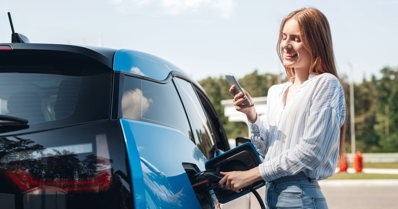A lot changes in a week.
In our round-up for last week we’ve compiled some of the biggest news stories across the industry.
Read on to learn more about how to avoid EV ‘charge rage’, new batteries with a 6-minute charge time, and a £200 million government investment towards the rollout of electric HGVs.
Avoiding ‘charge rage’
Many will have read the recent coverage of ‘charge rage’ across the UK media, with reported instances of fights breaking out as a result of poor ‘charging etiquette’ and insufficient availability at service stations.
In the wake of this coverage, the Telegraph published an article breaking down how to avoid charge rage for EV drivers, including charging off-motorway and more.
One of the key messages in this article is stressing the importance of planning your charging ahead of time, especially when looking at longer journeys. With EV charging software such as ours, you can gain access to real-time availability of chargers. It also enables you to be flexible with your EV charging, backing your journey with detailed mapping of a network of 300,000 chargepoints in the UK and Europe in your pocket.
Researchers develop EV battery material that can reduce charging times to six minutes
It seems like every week we’re writing about the latest innovation set the change the EV landscape, as investment in the industry continues to grow. Last week, the issue of battery range and charge times was once again tackled by researchers at Pohang University in South Korea who claim to have developed a new battery anode that can reach full charge in just six minutes.
The anode in the battery is made from manganese ferrite rather than the usual graphite, allowing it to store more lithium ions from the battery, which accounts for its rapid charging speed.
“We have offered a new understanding on how to overcome the electrochemical limitations of conventional anode materials,” said Professor Won Bae Kim, who led the research.
These innovations are just further proof of the growth potential of the EV industry, and highlight the need to future-proof your EV investments for the inevitability of technological advancement as attention and resources shift away from typical ICE vehicles.
Keeping up with latest technologies is one of the key advantages of using a software provider set up to work with any OCPP-compliant hardware. We often liken software to its use in the iPhone: you're able to upgrade your capabilities without having to add to or start again with the physical units.
This breakthrough is also a worthwhile reminder that, whilst EV issues definitely don’t bear ignoring or forgetting about, difficulties in new technologies are commonplace, and the limitations that persist in modern-day EV charging and vehicle performance are by no means there for good.
Government invests £200m on zero emission trucks
The UK saw another big investment in the decarbonisation of its transportation last week, as the government announced a £200 million boost to funding for HGVs.
The cash will be used to roll out up to 370 zero-emission HGVs in partnership with Innovate UK, who will also be expected to deliver nearly 60 charging stations alongside this to help power the vehicles. The funding will also be shared with retail giants like Sainsbury’s and M&S in order to help lower their overall emissions, as well as the rising cost of delivery by offsetting fuel expenditures.
This comes after Fleet News reported on the cost of vehicles being among the biggest obstacle to HGV decarbonisation, citing that more than half of HGV owners were worried about the cost in making the transition.
While the initial cost of transitioning especially HGV vehicles can often be high, the use of smart EV technology such as software can help you track ways to recoup your capital investment through significant energy savings in comparison to ICE equivalents. One way you can do this is by planning charging to take place during cheaper off-peak tariffs.
Opinion: The future of UK automotive is in tech, not just vehicles
Last week, Fleet News published an opinion piece discussing why they believe that the future of UK automotive is not just in vehicles, but in technology as well. While the publication delved into the need for improving areas of our EV rollout such as our national charging infrastructure, we’d like to stress why we believe this is particularly true in the case of charging software.
EV charging software is already beginning to be perceived as a huge driver in the EV market. And in tackling our infrastructure issues, it can be a huge help. Software such as ours allows, for example, the opening and closing of private chargepoint onto the larger public network, with the opportunity to have a private chargepoint made part of our extensive public charging network used by over 100,000 users to date. Of course, it’s essential that we continue to get additional chargers in the ground to meet the 300,000 chargepoints chargepoint number targetted by the UK Government by 2030, but a key part of that will be in using technology to make the most of the infrastructure already in place.
London college offers UK's first EV charger course
London South Bank Technical College became the first university to offer this course, as part of a pilot course built to instruct electricians on how to complete charger install.
With a target of 300,000 chargepoints to be installed on the UK network by 2030, concerns have been raised as to whether there’ll be enough qualified installers to help meet this target.
This offers a huge opportunity for installers to get in on the ground floor of an industry in the ascendency, with widespread investment already promised and clients ready to invest in the technology.
In partnering with EV charging software providers, installers have the chance to gain passive income opportunities while passing the stress of managing things like customer service to us with a 24/7 customer helpline available to partners and users.
We cover some of the benefits to installers of joining the EV industry, and in partnering with Clenergy on the installer section of our website, linked here.
That concludes our round-up of the biggest stories from the last week in EV news.
If you’re interested in learning more about the benefits of EV transitioning, and how our software has helped facilitate countless EV success stories already, head through to our growing case studies section, or click the link here to find out how we helped Nottingham City Council save £1 million a year in running costs, and 1,162 tons of Co2 emissions annually.



